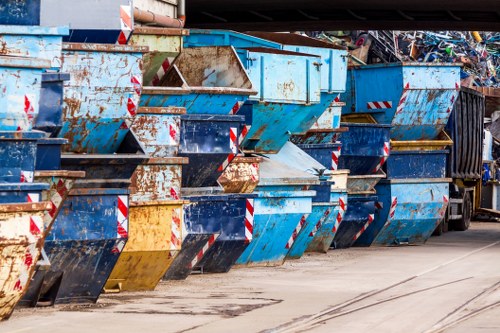Demolition Waste Removal in Enfield
Understanding Demolition Waste

Demolition waste refers to the debris generated during the dismantling or demolition of buildings and structures. This waste can range from concrete, bricks, and metals to wood, plastics, and hazardous materials. Proper management of demolition waste is crucial to ensure environmental sustainability and public safety.
In Enfield, the process of demolishing old structures is often necessary to make way for new developments. However, without effective waste removal strategies, the remnants of demolition can lead to significant environmental and health issues. Understanding the nature and composition of demolition waste is the first step towards effective waste management.
Different types of structures generate varying amounts and kinds of waste. For instance, residential buildings may produce more wood and drywall waste, while commercial structures might result in larger quantities of metals and concrete. Recognizing these differences helps in planning the appropriate waste removal and recycling methods.
Importance of Proper Waste Removal

Proper demolition waste removal is essential for several reasons. Firstly, it helps in reducing the environmental impact by minimizing landfill usage and promoting recycling. Landfills are quickly reaching their capacity, and diverting waste from them is crucial for sustainable development.
Secondly, effective waste removal enhances public safety. Debris left unattended can pose hazards to the community, attracting pests and creating unsafe conditions for pedestrians and drivers. Timely removal ensures that demolition sites do not become safety liabilities.
Moreover, proper waste management contributes to the economic efficiency of demolition projects. Efficient removal processes can reduce overall project costs by streamlining logistics and minimizing delays caused by waste accumulation.
Demolition Waste Removal Process

The demolition waste removal process involves several key steps to ensure that waste is handled responsibly and efficiently. These steps include planning and assessment, collection and sorting, and transport and disposal.
Planning and Assessment: Before commencing demolition, a thorough assessment of the site is conducted to identify the types and quantities of waste expected. This helps in determining the resources and methods required for waste removal.
Collection and Sorting: Waste materials are collected and sorted based on their type and recyclability. Sorting is essential to maximize recycling rates and ensure that hazardous materials are handled appropriately.
Recycling and Reuse of Demolition Waste

Recycling demolition waste not only conserves natural resources but also reduces the environmental footprint of construction projects. Materials such as concrete, metal, wood, and glass can be recycled and reused in new construction endeavors.
Benefits of Recycling:
- Reduces the need for virgin materials
- Decreases greenhouse gas emissions
- Conserves landfill space
- Promotes sustainable construction practices
Implementing effective recycling strategies can significantly enhance the sustainability of demolition projects in Enfield, making it a model for other regions to follow.
Choosing a Demolition Waste Removal Service in Enfield

Selecting the right demolition waste removal service is critical to the success of any demolition project. When choosing a provider in Enfield, consider factors such as experience, compliance with local regulations, and the range of services offered.
Factors to Consider:
- Licensing and Certifications
- Experience in handling various types of waste
- Recycling capabilities
- Customer reviews and reputation
Opting for a professional service ensures that waste is managed efficiently, safely, and in compliance with all applicable laws and regulations.
Cost of Demolition Waste Removal
The cost of demolition waste removal in Enfield can vary based on several factors. These include the volume and type of waste, the complexity of the project, and the chosen disposal or recycling methods.
Pricing Factors:
- Volume of waste to be removed
- Distance to disposal sites
- Type of materials being handled
- Labor and equipment costs
Understanding these factors can help property owners budget effectively and choose services that offer the best value for their specific needs.
Regulations and Compliance
Adhering to local regulations and compliance standards is a non-negotiable aspect of demolition waste removal. In Enfield, several laws govern the handling, transportation, and disposal of demolition waste to protect the environment and public health.
Local Regulations in Enfield:
- Permits required for demolition activities
- Proper documentation for hazardous waste
- Mandatory recycling targets
Compliance with these regulations ensures that demolition projects are conducted legally and responsibly, avoiding potential fines and legal issues.
Tips for Effective Waste Management
[p] [/p]
[/p]
Effective waste management during demolition not only streamlines the process but also enhances sustainability. Here are some practical tips to achieve this:
- Minimize Waste: Plan the demolition to reduce unnecessary waste generation.
- Efficient Sorting Practices: Sort materials on-site to facilitate recycling and reuse.
- Engage Professionals: Hire experienced waste removal services to ensure optimal handling of materials.
- Regular Monitoring: Continuously monitor waste disposal practices to maintain compliance and efficiency.
Implementing these strategies can significantly improve the efficiency and environmental impact of demolition projects.
FAQs about Demolition Waste Removal

How long does the removal process take?
The duration of the demolition waste removal process depends on the size and complexity of the project. On average, small to medium-sized demolitions can take anywhere from a few days to a couple of weeks.
What materials can be recycled?
Commonly recycled materials include concrete, metals, wood, glass, and certain plastics. Additionally, hazardous materials require special handling and disposal methods.
Conclusion
Demolition waste removal in Enfield is a critical component of sustainable construction practices. By understanding the types of waste, adhering to regulations, and employing effective waste management strategies, property owners can ensure that demolition projects are conducted responsibly and efficiently.
Choosing a professional demolition waste removal service not only simplifies the process but also promotes environmental stewardship and public safety. For those planning a demolition project in Enfield, prioritizing waste removal is essential for achieving long-term sustainability and compliance.
Contact us today to learn more about our demolition waste removal services and how we can assist you in managing your project efficiently.